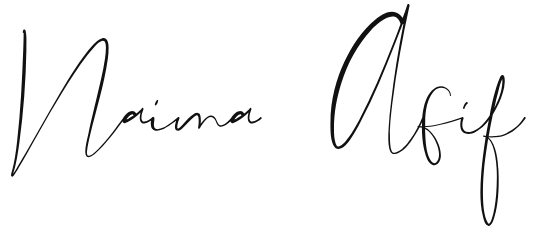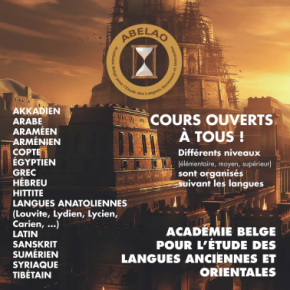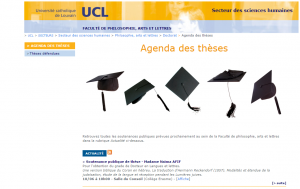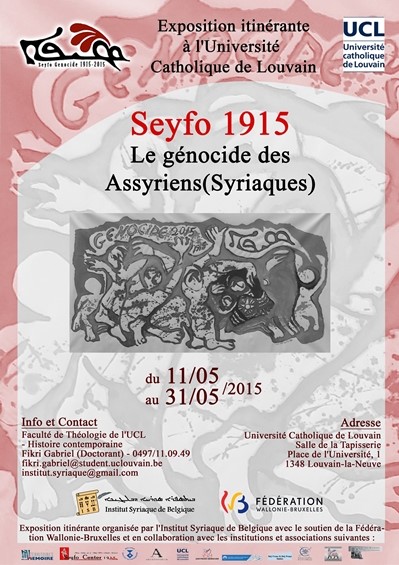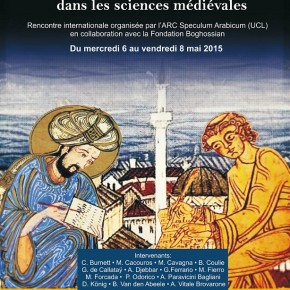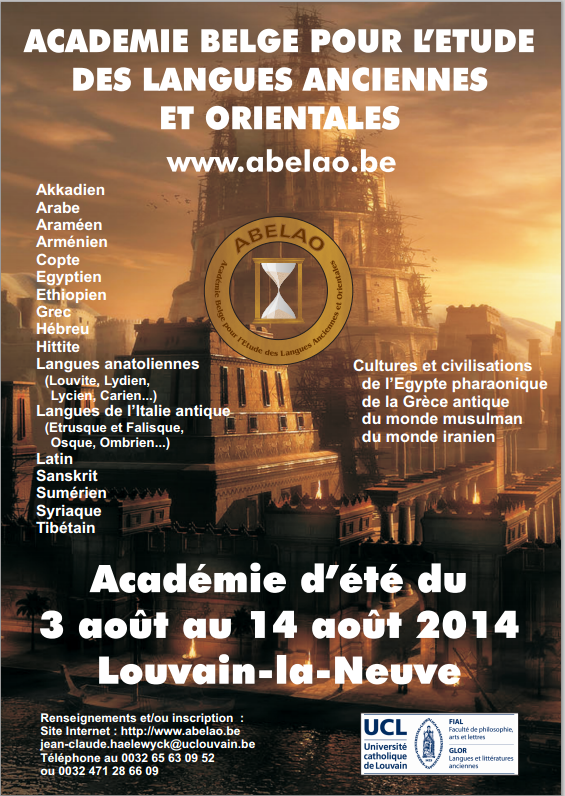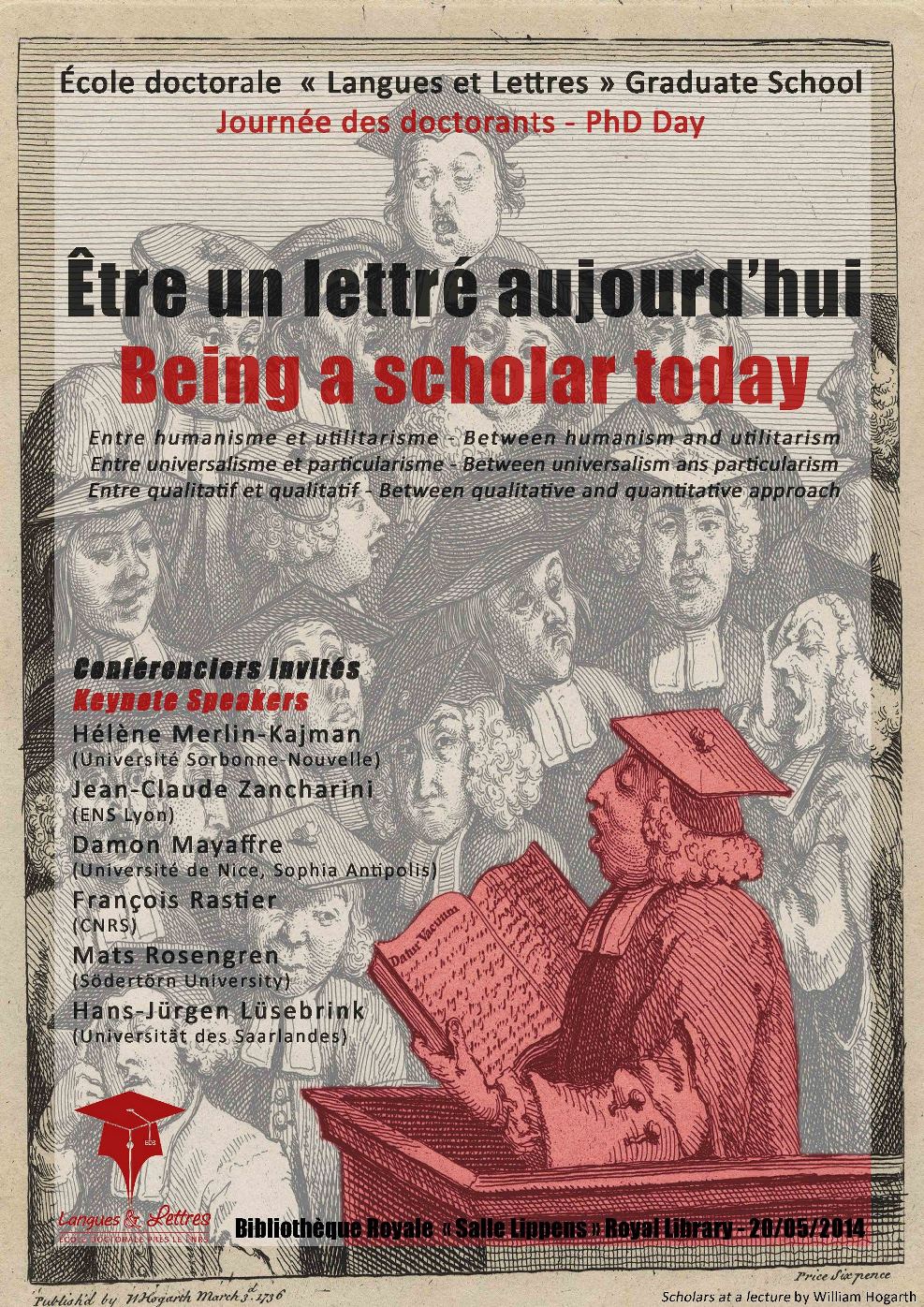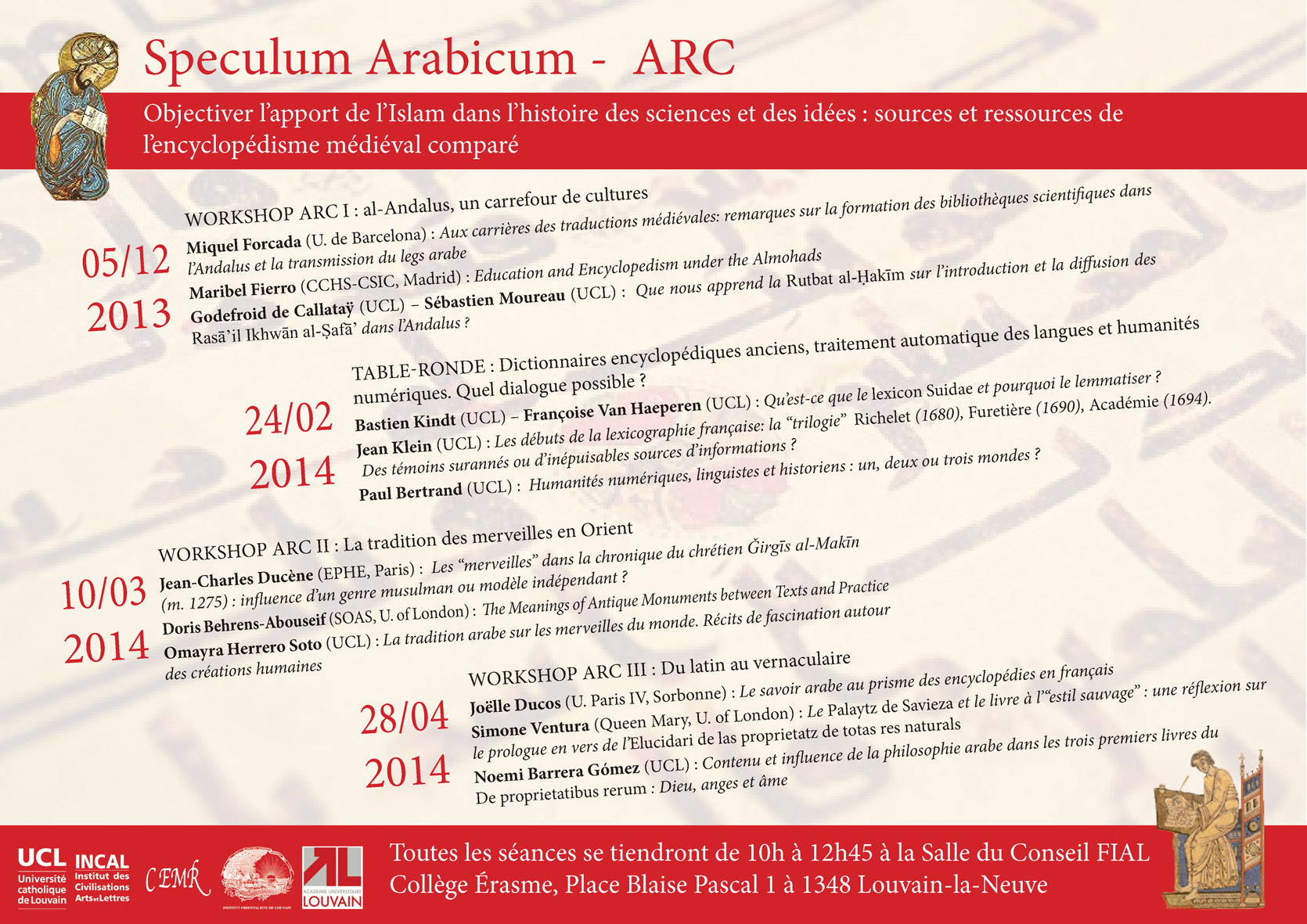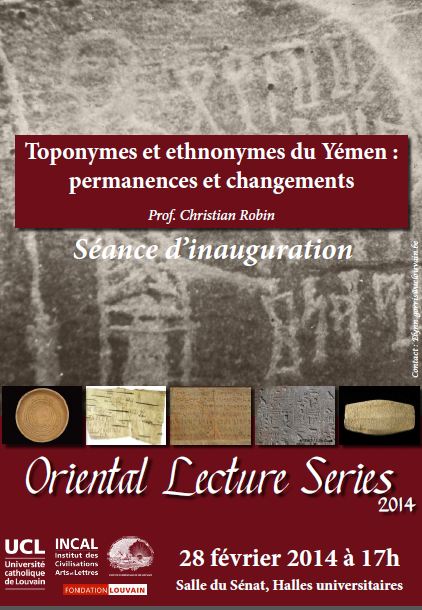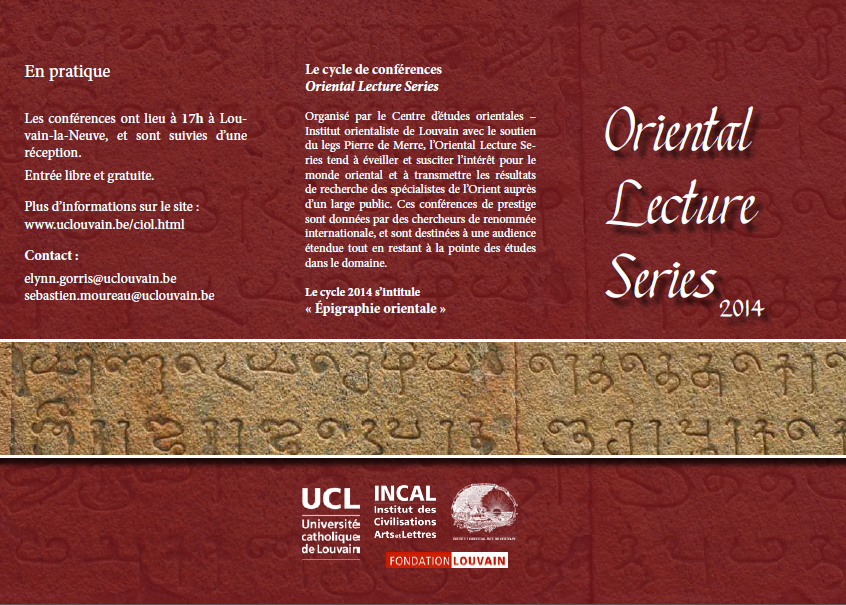« Aux sources épigraphiques »
Vendredi 9 mai 2014
Louvain-la-Neuve, Collège Erasme, Salle du Conseil FIAL
Programme
— Session matinale —
09h00 Mot d’introduction
[présidence : Bernard Coulie]
09h15 Johannes den Heijer, Épigraphie arabe du Caire fatimide
09h35 Claude Obsomer, Une expédition aux carrières d’Hammamat sous Sésostris Ier
Alice Coyette, Une nouvelle lecture d’un texte d’Hatchepsout à Deir el-Bahari
Nicolas Gauthier, Les légendes de quelques scènes de la Salle Hypostyle de Karnak
Johanne Garny, Une inscription de Khâemouaset à Assouan
10h30 pause café
[présidence : Anne-Marie Doyen]
10h50 Yves Duhoux, L’épigraphie en terre grecque : questions de méthode
11h10 Patrick Marchetti, L’as d’argent dans les inscriptions d’Asie Mineure
11h30 Charles Doyen, Seize couronnes d’or pour les Sarapeia
11h50 Christophe Flament, Inscriptions attiques relatives à la gestion des carrières de pierre
12h10 Présentation de livres :
* Anne Tihon :
Anne Tihon et Jean-Luc Fournet, Conformément aux observations d’Hipparque : le Papyrus Fouad 267 A (Publications de l’Institut Orientaliste de Louvain, 67), Louvain-la-Neuve, Peeters, sous presse.
* Bernard Coulie :
Sancti Gregorii Nazianzeni opera, versio iberica, VI. Orationes XI, XXI, XLII, editae a Bernard Coulie et Helene Metreveli (Corpus Christianorum, Series Graeca, 78. Corpus Nazianzenum, 26), Turnhout, Brepols, 2013, X+359pp.
Sancti Gregorii Nazianzeni opera, versio arabica antiqua, VI. Orationes XI, XLI, editae a Jacques Grand’Henry (Corpus Christianorum, Series Graeca, 85. Corpus Nazianzenum, 27), Turnhout, Brepols, 2013, XLVI+253pp.
* Pierre Assenmaker :
M. VON ALBRECHT, La littérature latine de Livius Andronicus à Boèce et sa permanence dans les lettres européennes. Tome I. Traduit de l’allemand par P. Assenmaker avec la collaboration d’A.-M. Doyen-Higuet et H. Seldeslachts. Bibliographie mise à jour par l’auteur avec le concours du traducteur (Collection d’Études classiques, 26), Louvain-Namur-Paris, Peeters, 2014, XIX+911 p.
* Actualités PIOL, Safran, Babelao
— Session de l’après-midi —
[présidence : Christophe Vielle]
14h00 Jan Tavernier, Lambert Isebaert, Bastien Kindt,
L’inscription trilingue (perse, parthe, grecque) des Res Gestae Divi Saporis
14h55 Lauriane Locatelli, Une mystérieuse inscription d’Antiphellos en Lycie
15h15 pause café
[présidence : Claude Obsomer]
15h30 Marco Cavalieri,
Et Graecis et Latinis et Persicis et Iudaicis et Aegyptiacis litteris ut ab omnibus legeretur
15h50 Kanako Goto, L’épée d’Eta Funayama (5e-6e siècles) et l’arrivée de l’écriture au Japon
16h10 Les inscriptions orientales du Collège Érasme (couloir « ORI »)
* Jean-Claude Haelewyck, L’inscription phénicienne du sarcophage d’Eshmunazar
* Jan Tavernier, L’inscription akkadienne de l’obélisque de Manishtushu
— Conférence « Oriental Lecture Series » —
17h00 Grant Frame (University of Pennsylvania), Lost in the Tigris : The Trials and
Tribulations in Editing the Royal Inscriptions of Sargon II of Assyria (721-705 BCE)
18h30 Réception « Oriental Lecture Series » ouverte à tous
Organisation : FIAL/GLOR et INCAL/CIOL
Source: CIOL
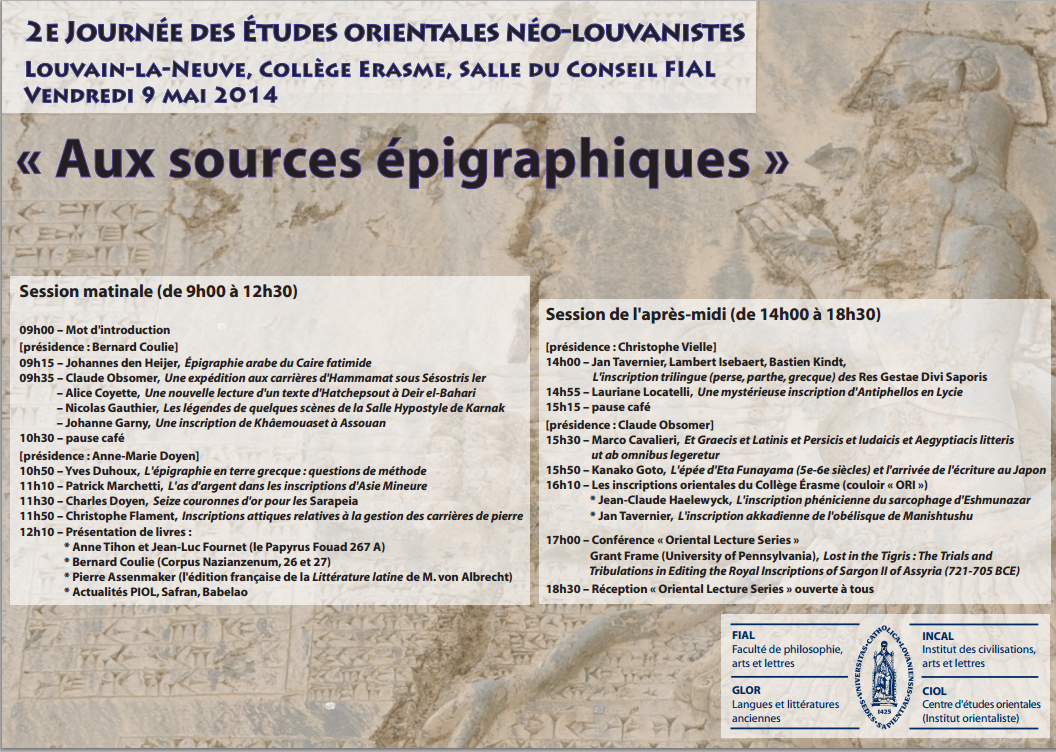
 Holy Hero(in)es. Literary Constructions of Heroism in Late Antique and Early Medieval Hagiography
Holy Hero(in)es. Literary Constructions of Heroism in Late Antique and Early Medieval Hagiography